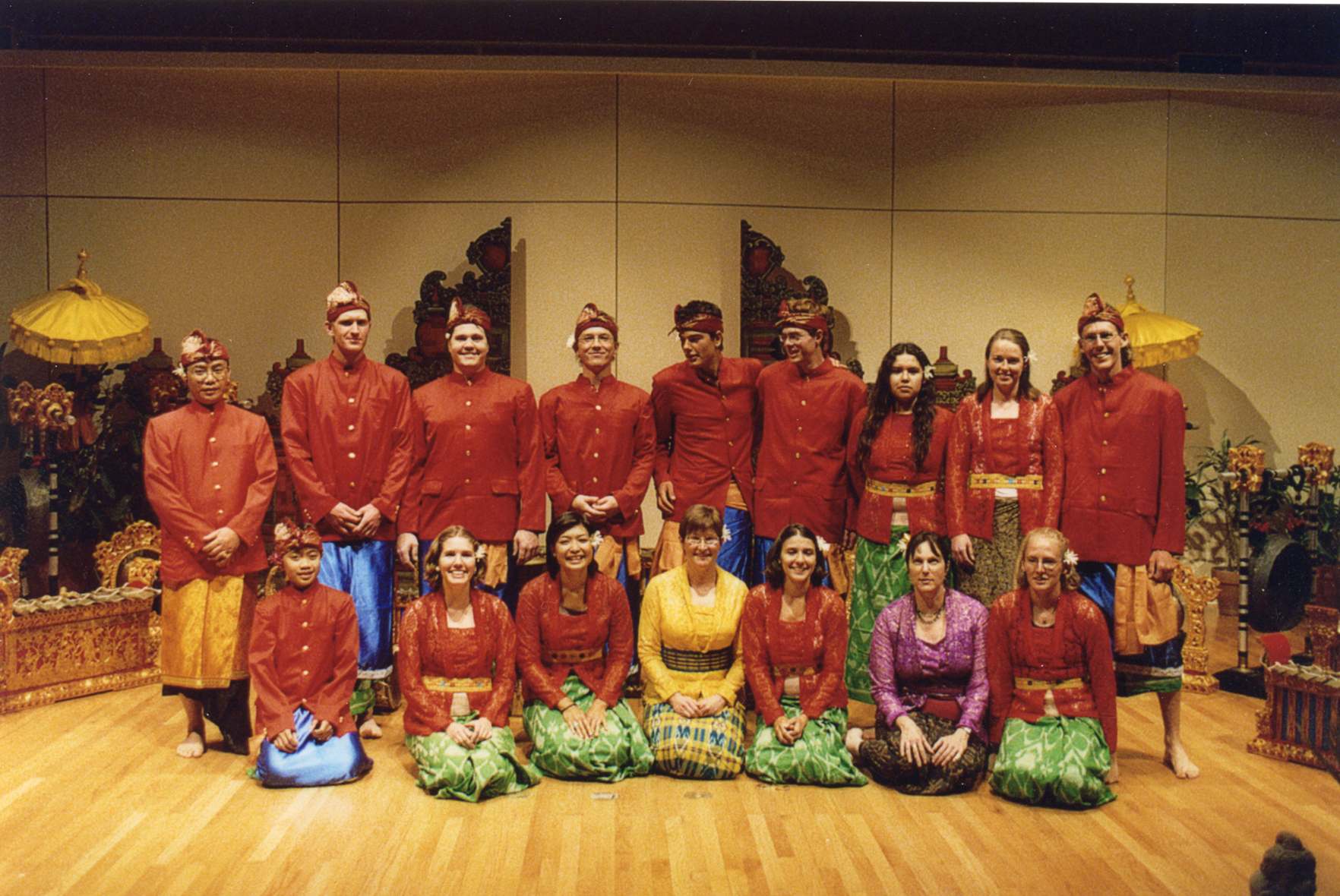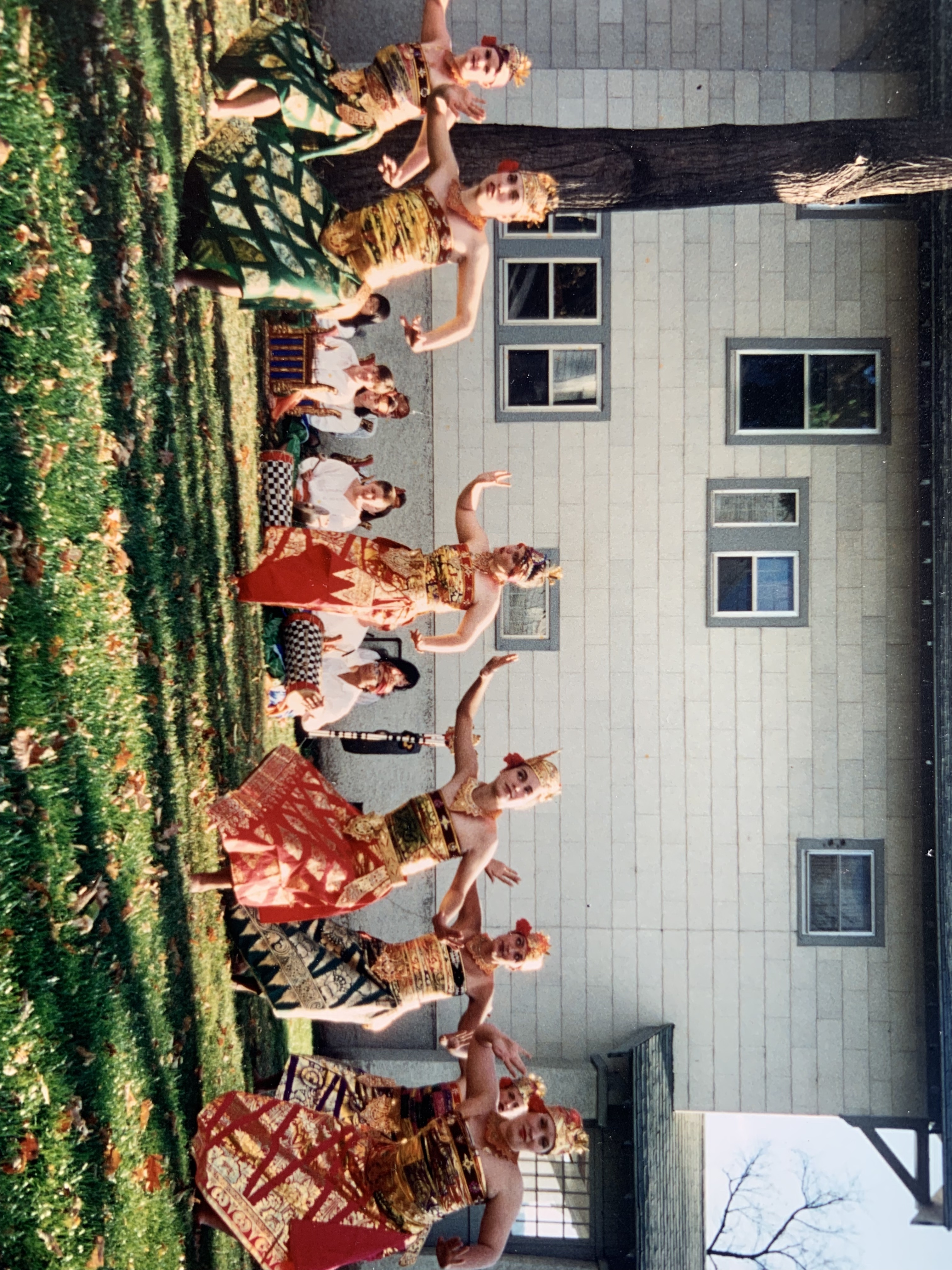Professor Emerita Dr. Victoria Lindsay Levine brought Gamelan and I Made Lasmawan to CC in 1993
This year, the Colorado College Music Department celebrates 30 years since the founding of its Indonesian music program.
The college will commemorate the anniversary during the CC gamelan ensemble's spring concert, beginning at 3 p.m. Sunday, May 21 in Packard Hall, with a reception to follow the concert. The program features Gamelan Tunjung Sari, CC Balinese dancers, and alumni and friends who have all been instrumental to the success of the ensemble since it was created in 1993 by Professor Emerita Dr. Victoria Lindsay Levine.
"For three decades the CC Gamelan program has been an integral part of our collective campus experience," said Ryan Bañagale '00, associate professor of music and Music Department co-chair. "A multitude of students from all areas of study have brought to life this rich musical tradition through departmental concerts and performances at all-college celebrations, such as our recent inauguration of President L. Song Richardson."
Students who participate in the CC gamelan have the opportunity learn to play six different kinds of gamelan — Balinese gamelan angklung, gender wayang, suling gambuh, balaganjur, and joged, as well as Javanese gamelan ageng — under the instruction of acclaimed Balinese master drummer I Made Lasmawan, who has been with the program since its inception.
The ensemble is active on campus, in the greater Colorado Springs area and beyond, performing often at Music at Midday in addition to its end-of-semester concerts in Packard Hall, as well as in venues throughout the Front Range region and overseas in Bali.
Building the program
The CC gamelan program began with Levine, an ethnomusicologist who joined the CC Music Department in 1988. She had played Balinese gamelan angklung as an undergraduate at San Francisco State University, and one of her first pursuits at CC was starting a Balinese gamelan. She used funding in 1991 from her position as the John D. and Catherine T. MacArthur Professor and assistance from Dr. David Harnish, a fellow ethnomusicologist, to locate and ship some Balinese instruments — a gamelan angklung orchestra and a gamelan gender wayang quartet — to the college.
The instruments arrived in October 1992, "in huge custom-built wooden packing crates too big to fit through the front door of Packard Hall, so they were brought in through the west parking lot entrance, where they filled the entire entry area," Levine recalled. "Dan Wiencek '91, who was then the music department paraprofessional, along with renowned ethnomusicologist Dr. Bruno Nettl (1930-2020), who was a block visitor at CC, helped me pry open the crates with a crowbar and unpack the instruments. My then 2-year-old daughter, Elizabeth, also 'helped' with the unpacking."
A month later, Levine found the last piece to complete CC's gamelan: Lasmawan. He was at that time interviewing for the Artistic Director position with the Denver gamelan, Tunas Mekar. He won that audition, and around the same time was also offered the position of Gamelan Director at CC. He continues to lead the ensembles, and Lasmawan has since become a lecturer in music at CC and teaches academic courses in Balinese music.
Levine didn't waste any time after Lasmawan was hired: Gamelan instruction started in spring 1993. Jill Frederickson, of Gamelan Tunas Mekar, assisted Lasmawan while he adjusted to teaching music in the U.S., "which is radically different from teaching music in Indonesia," Levine said. Harnish continued to support by offering two academic classes that spring as well: one on general Southeast Asian music and another focused specifically on Indonesian music. Levine would then team teach Indonesian music classes with Lasmawan for the next 25 years until she retired in 2020. She also helped to get Balinese dance class going in 1994, initially taught by Lasmawan's first wife, Siti Maryuni, and now taught by Lasmawan's second wife Ni Ketut Marni since 1997.
"Most Balinese people, when they come here, they miss a lot of Bali and they're lonely, but building the gamelan community here and in Denver, it made me not miss Bali too much because we are connected to Bali through our friends and family," said Lasmawan, whose sons Ade Wijaya and Putu Hiranmayena have also continued the family tradition of playing gamelan. "Colorado has been my second home."
Lasmawan received his degree in Indonesian traditional gamelan music from conservatories in Bali and Java. He taught for several years in Java before arriving in the U.S. in 1990. Considered one of the foremost experts in gamelan performance and Indonesian music, Lasmawan is featured in Elizabeth A Clendinning's book American Gamelan and the Ethnomusicological Imagination, which examines the history, education, and practice of gamelan in the U.S.
Impacting students
Summer study abroad classes to learn and perform in Indonesia are now staples in the CC catalog, and the first session was offered in summer 1997. Led by Levine and Lasmawan, "The Arts and Culture of Bali" saw 18 CC students travel to his home village, Bangah, to study, dance, and play gamelan as part of a village temple ceremony. That group of students included Elizabeth Macy '00, a CC music major who went on to earn a Ph.D. in ethnomusicology at UCLA and is now Assistant Professor of Ethnomusicology at Metropolitan State University of Denver. Macy now team teaches the summer class in Bali with Lasmawan.
"It’s not enough to say that Gamelan Tunjung Sari, Pak Made Lasmawan, and Dr. Levine have been influential in my life," Macy said. "I’m often struck by how one tiny thing can shape the things we do. Saying yes to Bali at 18 years old has impacted my life in countless ways."
Macy's very first class at CC in Fall 1996 was Levine's World Music course, a two-block class that provided a variety of hands-on musical experiences. One of them was Balinese gamelan with Lasmawan.
"I couldn't have placed Indonesia on a map at the time," Macy said. She and her classmate Yvette McGrew Martin '00 decided to join the CC gamelan so they could go abroad. "In Bali, our group, including Kristina Schauer '00 and Kaori Katsumata '18 MAT, traveled north, horns blaring, on the most chaotic roads – roads that are now familiar to me. We were staying in Pak Made’s village, spread out over several locations. We traveled the island, played music, learned to dance, attended performances, and settled into Balinese village life — where a flushing toilet was cause for celebration."
Macy would return to Bali two years later, in summer 1999, to study women's gamelans with the assistance of a Shannon McGee Prize in Women's Studies. Being part of Gamelan Tunjung Sari and making those trips to Bali are key to many of Macy's memories at CC and were instrumental in her path in life since graduating. She earned her MA from UC Riverside, where her thesis focused on the role of cultural tourism in Bali. Her doctoral dissertation at UCLA was a comparative study of Bali and New Orleans, examining music and tourism in post-disaster economies. While completing her dissertation, Macy returned to CC in Fall 2008 to cover Levine's World Music and Comparative Music Theory classes.
"I was fortunate enough to collaborate with Pak Made and Ibu Ni Ketut Marni," she said. "My time in Colorado Springs was also fortuitous, because after a number of years of heightened travel warnings, Indonesia was reopening for study abroad."
She consulted with Levine and Lasmawan on a proposal to take students to Bali once again, and 11 students joined the class for June 2011 — the first trip to Bali offered to CC students since 1999. Macy called it a "full-circle moment," though she wouldn't return to Colorado full time until summer 2017. Since then, in addition to her teaching duties at MSU Denver and team-teaching the study abroad course with Lasmawan over the summers, she performs regularly with CC's Gamelan Tunjung Sari and with Denver's Gamelan Tunas Mekar.
"Pak Made, Bu Ketut, and their sons are my second family, and I’m so happy to be located near Dr. Levine — especially now that she is in Denver," Macy said.
Many of the CC Gamelan alumni feel the same way. Allen Zheng '19, now a Ph.D. candidate at UC Riverside and currently completing fieldwork in Cambodia, joined the Balinese dancers in Tunjung Sari late in the fall semester of 2016 and was surprised to find himself performing on stage almost immediately in the December concert.
"I am deeply indebted to the work that Ibu Ketut, Pak Made, Vicki, and Liz have put into Gamelan Tunjung Sari," said Zheng, recalling many "spontaneous moments" in rehearsal when he was asked to fill in at the last moment to complete a formation and during a particular performance outside Tutt Library when he might have been needed with the dancers or playing gangsa for a piece.
These moments "led to some of the most meaningful experiences for me as a musician," he said. "Not only did I learn to listen to dance and to watch sound, I learned to be spontaneous and adapt on the fly. As I continue through my Ph.D. program, these experiences continue to shape how I think about music and dance in my scholarly work. I am glad to have spent so much time during my undergrad in Tunjung Sari and someday hope to make new memories in the future."
Cultivating tradition
Levine co-directed CC gamelan from its inception until her retirement. She was a champion for the program and ensured its growth, managing all administrative aspects of the ensemble that included securing funds to cover the costs of two concerts per year and for Lasmawan's salary until the college institutionalized the program in 1997. She worked with the college's attorneys for a year to ensure Lasmawan obtained the appropriate visa, which enabled him to apply for a Green Card. She compiled information for the concert programs and wrote the program notes, handled publicity, and managed the ensemble's budget. She enjoyed performing as part of the ensemble until 2016.
She is grateful for how much support the program has received over the last 30 years, such as former CC president Katherine Mohrman providing a grant from her 1994 inaugural discretionary fund to help it develop, and the Asian Studies program offering significant funding in the early years to support Lasmawan's salary and to purchase concert uniforms. The program has flourished thanks to Levine's efforts.
"When I founded the gamelan, Dr. Timothy Cheek, formerly a CC professor of history, was in the process of starting the college’s Asian Studies program," Levine said. "He considered the gamelan integral to Asian Studies, calling it 'the third leg of the stool' — the other two legs being history and language."
Right after he arrived at CC, Lasmawan blessed the instruments and bestowed the name Gamelan Tunjung Sari, following the Balinese tradition for the teacher, or guru, to name the ensemble prior to its first use. Levine said Gamelan Tunjung Sari basically translates to "Lotus Blossom," a richly symbolic flower in Balinese Hindu-Buddhist spirituality.
"The lotus symbolizes both the challenges of life (muddy water) and the beauty of life (the blossom). Lotus plants grow in shallow, muddy water, but as you’ve seen, the blossoms are incredibly lovely," said Levine. The lotus blossom symbolism is appropriate for an academic setting because it embodies many of the lessons that instructors work to instill in their students. "It can grow in very little water in a muddy situation if the timing is right. It represents the ability to overcome adversity ... The muddy water in which lotus plants grow represents the hard parts of life — illness, war, human suffering, grief — whereas the blossom represents hope, optimism, compassion, beauty."







